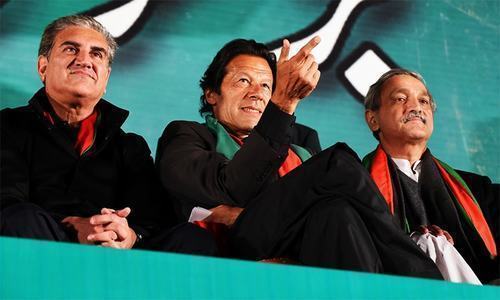ISLAMABAD: Taking a step forward to fulfil its promise of retrieving ill-gotten wealth of Pakistanis in foreign countries, the government has formed a high-powered task force comprising officials of the Federal Investigation Agency, National Accountability Bureau as well as intelligence agencies
In this regard, the government has decided to enforce an anti-corruption rule which offers informers 20 per cent of the looted wealth recovered through information provided by them. The rule exists in accountability laws but has seldom been enforced.
The government also made another significant decision to introduce uniform curriculum not only in public and private schools but also in religious seminaries (madressahs).
Cabinet decides to introduce uniform curriculum not only in public and private schools but also in madressahs
These decisions were made in a federal cabinet meeting held at PM Office on Wednesday with Prime Minister Imran Khan in the chair.
The meeting also decided to abolish discretionary funds of all ministries estimating that with this move, over Rs 80 billion would become available to the national kitty.
Under other decisions, the government will establish an orphanage in the federal capital to offer shelter to homeless beggar women and children and provide assistance to Pakistanis languishing in prisons of foreign countries so that they could be reunited with their families.
“Initially we will target 100 big fish to retrieve their ill-gotten wealth stashed in foreign countries,” said Special Assistant to Prime Minister on Accountability Shahzad Akbar at a press conference held after the cabinet meeting. Information Minister Fawad Chaudhry was also present.
Mr Akbar said the whistle-blower law would be enforced immediately through an ordinance offering a reward worth 20 per cent of the recovered amount to those people who would help recover such money. The names of informants would be kept confidential.
The special assistant said another ordinance on mutual legal assistance would be promulgated which would help remove bottlenecks in the way of seeking information regarding illegal wealth from foreign countries.
He said Prime Minister Imran Khan had directed the foreign ministry to send a high-powered delegation to Switzerland to expedite ratification of a treaty on exchange of information on bank accounts. “Unfortunately the treaty has been dumped in files since 2012 intentionally by the previous rulers, instead of being ratified. Now the prime minister has issued directives to immediately ratify the treaty so that the government can get information regarding transfer of corruption money into Swiss banks by the Swiss authorities,” he added.
Responding to a question about the total amount of money laundered abroad, the special assistant said it would be difficult to say what it was but the main thing was that the government was committed to retrieving it.
Mr Akbar said the prime minister was so concerned about the recovery of looted money that he would himself monitor the progress of the task force and other relevant departments in this regard.
Information Minister Fawad Chaudhry said the prime minister wanted uniform curriculum not only in private and public sector schools but also in seminaries.
“Different modes of education in different types of schools is the source of disparity in our education system and divides our children in different categories,” he said.
The minister said introducing uniform curriculum in the whole country was not an easy task but the federal government was committed to doing that with the cooperation of the provincial governments.
“We know that education, health, sanitation and provision of potable water are provincial subjects but they will be driven from the Centre,” he added.
Education became a provincial subject after the 18th Amendment and the decision of uniform curriculum is expected to spark a controversy in the country over the ‘centre’s interference’ into provincial affairs.
The Pakistan Tehreek-i-Insaf (PTI), which is ruling at the centre and in the provinces of Punjab and Khyber Pakhtunkwa, will have to convince the government of two other provinces — Sindh and Balochistan — in this regard. “We believe that no provincial government will oppose the idea that all children of the country should have a similar opportunity of seeking education,” he hoped.
The information minister said the cabinet had also decided to take concrete steps to provide education to over 25 million children who were presently out of schools.
Regarding Pakistani prisoners in different countries, he said there were more than 10,000 Pakistani nationals in jail abroad and the government wanted to help them so that they could return to their families.
He said approximately 3,000 Pakistani prisoners on death row in Iran would be granted relief since Tehran had amended its anti-narcotics laws.
“We took up the matter with Iranian Foreign Minister Javad Zarif during his recent visited to Islamabad and the Pakistani embassy is also in touch with the prosecutor general in Tehran for early release of the prisoners,” Mr Chaudhry added.
The cabinet also made decisions on initiatives regarding health, water and sanitation. “Although they fall under [the domain of] the provinces, we think they are important (sectors) and will be driven by the federal government,” he said.
He reiterated the government’s resolve to provide due rights to all minorities as guaranteed in Islam.
The information minister’s statement comes a day after he defended the appointment of Atif Mian, a leading international academic, to the government’s Economic Advisory Council amid criticism in the social media that the expert belongs to the Ahmadi faith.
“Those who have objections to Mian’s appointment are basically extremists, and we will not bow to extremists,” the minister said. “Protecting minorities is our responsibility. It is the religious duty of every Muslim, not just the government, to protect minorities and respect those they live with.”
Replying to a question, Mr Chaudhry said, “Protection of minorities is an integral part of Islamic principles. When we speak about Khatm-i-Nubuwat, we recognise the finality of Prophet Muhammad (peace be upon him) and we also recognise Islamic education which teaches us about rights of minority communities.”
Published in Dawn, September 6th, 2018













































